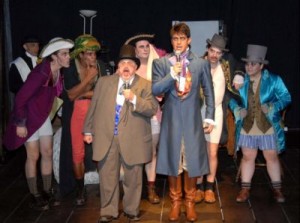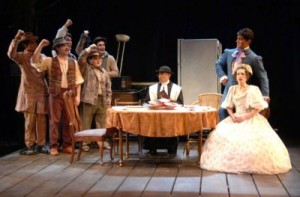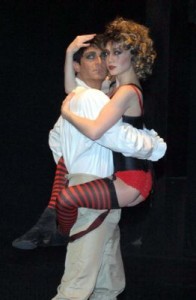
Fans of The Threepenny Opera will be hard-pressed to find a better production of the Kurt Weill-Bertolt Brecht classic than International City Theatre’s current revival. Directed with consummate vision and artistry by Jules Aaron, beautifully choreographed by Broadway’s Kay Cole, performed by a sensational cast accompanied by a masterful quintet of musicians, and designed by a SoCal “dream team,” this Threepenny Opera may well be ICT’s all-around best musical production in years.
At the same time, I have to confess that the work itself is unlikely to ever crack my list of 100 favorite musicals, or even the top 250. Though I may be in the minority on this, The Threepenny Opera ends being for me an acquired taste.
Composer Weill and book writer/lyricist Brecht’s 1928 adaptation of John Gay’s 18th Century The Beggars Opera is one of the earliest examples of the modern musical comedy genre. Its 1956 off-Broadway production ran a then unheard of (for an off-Broadway show) 2,707 performances and spawned one of the biggest pop hits of the 1950s, Bobby Darin’s Mack The Knife.
It’s “The Ballad Of Mack The Knife” that opens The Threepenny Opera, sung with Vegas showmanship by Brian Crawford Scott, though those expecting more of the same kind of catchy, sing-along hits should stand warned—Kurt Weill’s music is often dirge-like and even off-putting to those expecting anything like what most of us think of as “Broadway melodies.” For those unfamiliar with the score, listening a few times to any of the several Threepenny Opera cast recordings will enhance your enjoyment of the production, though you are still unlikely to find yourself humming along or recalling tunes once you’ve left the theater. A quick reading of Wikipedia’s synopsis may also be helpful to those unfamiliar with Threepenny Opera’s plot, which can be difficult to follow.
Suffice it to say, Polly Peachum, daughter of Victorian London “beggar boss” Jonathan Jeremiah Peachum, falls for Macheath, aka Mack The Knife, head of a gang of crooks and famous for using his knife to bloody effect. Polly would seem to have at least two rivals for Macheath’s affections—Lucy Brown, daughter of London Police Chief Jackie “Tiger” Brown, and Jenny Diver, prostitute. For a show filled with songs in minor chords, Brecht’s book is often jokey, and though The Threepenny Opera gives its hero (and audience) a happy ending, it’s not what you’d call a “feel-good” show. A strange bird, this Threepenny Opera.
That being said, Aaron’s direction, Cole’s choreography, Darryl Archibald’s musical direction, the fourteen-member cast, and a design team extraordinaire combine to create a production which I very much enjoyed, as much as an demonstration of our Los Angeles theater talent as for the material itself.
Aaron’s direction is suitably stylized with slapstick sequences throughout, including a hilarious “mini pie fight” between two of the female protagonists. Since the characters often announce their intention to sing before breaking out in song, it makes sense that many of the musical numbers end up being performed directly facing the audience. Brecht’s dialog (the 1989 Michael Feingold version used here is one of numerous translations) does not encourage the kind of “natural” acting contemporary audiences are accustomed to, thus the performances here are appropriately broad.
The part of Macheath is one Jeff Griggs seems born to play. The handsome leading man with the impossibly pale blue eyes has never been anything less than charismatic in any of the many diverse roles I’ve seen him in. Here he reveals a sly sense of humor, smoldering sexuality, and a glorious opera-ready voice.
Opposite Griggs is a trio of absolutely gorgeous and gorgeously talented female performers. As Polly, Shannon Warne (one of our most enchanting musical theater leading ladies) combines beauty, sex appeal, comedic gifts, and a glorious soprano/pop belt. Zarah Mahler burns up the stage as Jenny Diver, a 180-degree turn from her “good girl” roles in Great Expectations and Kiss Of The Spider Woman, a stunning, sexy actress with a great set of mezzo pipes. Rachel Genevieve is wonderful too as Lucy Driver, a lovely comedienne with the voice of an angel.
Vocally, this cast tops any of those in the three cast recordings I listened to in preparation for the ICT production.
Tom Shelton and Eileen T’Kaye are scene-stealers as Peachum and his semi-toothless wife, a pair who could just as easily have emerged from the pages of Dickens. The same can be said of Peachum’s band of thieves and beggars—Gabriel Corbin, Daniel Vincent Gordh, “balladeer” Scott, and particularly Jake Wesley Stewart (in his biggest role and best performance yet of the several shows I’ve seen him in). The quartet’s broad characterizations are laugh-getters, and as a bonus, all look hot indeed in their body-hugging undergarb (courtesy of costume designer Shon LeBlanc). Michael Uribes is yet another scene-stealer as beggar-in-training Felch, a young chap with a penchant for hiding under Mrs. Peachum’s skirts. Completing the cast in absolutely fine fashion are feisty Julie Carillo as Vixen/Ed, and imposing Paul Zeglar as Chief Of Police “Tiger” Brown.
Cole’s excellent choreography eschews chorus line kicks for more subtle, seductive moves. Archibald, on keyboard, leads a smashing five-piece band, which also includes Chris Mauer, Stephen Cardenas, Alan Peck, and Joe Jewell.
If there’s anything that gives ICT’s Threepenny Opera that extra special something, it’s the show’s utterly gorgeous look. John Iacovelli’s set is designed in wood planks which lead up to a scaffold from which extends a hangman’s noose and behind which the ever-present moon shines down on the London night. Jared A. Sayeg’s lighting design is one of the best ever from this young master of stage lighting, with light shining up through the floorboards, and an array of colored beams shining down from above. LeBlanc’s as-always terrific period costumes are appropriately frilly and fanciful or rough and ragged as character demands. Paul Fabre’s sound design expertly mixes voices and instruments with crystal clarity.
Though The Threepenny Opera itself isn’t likely to find itself on my list of “must-see-again” shows, I feel fortunate indeed that my first exposure to it was in a production as fine as this one. Kurt Weill fans will surely be in Brechtian heaven, or vice versa.
International City Theatre, Long Beach Performing Arts Center, 300 E. Ocean Blvd., Long Beach.
www.ictlongbeach.com
–Steven Stanley
February 26, 2009
Photos: Shashin Desai





 Since 2007, Steven Stanley's StageSceneLA.com has spotlighted the best in Southern California theater via reviews, interviews, and its annual StageSceneLA Scenies.
Since 2007, Steven Stanley's StageSceneLA.com has spotlighted the best in Southern California theater via reviews, interviews, and its annual StageSceneLA Scenies.







 COPYRIGHT 2024 STEVEN STANLEY :: DESIGN BY
COPYRIGHT 2024 STEVEN STANLEY :: DESIGN BY